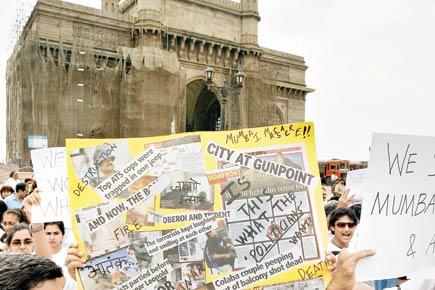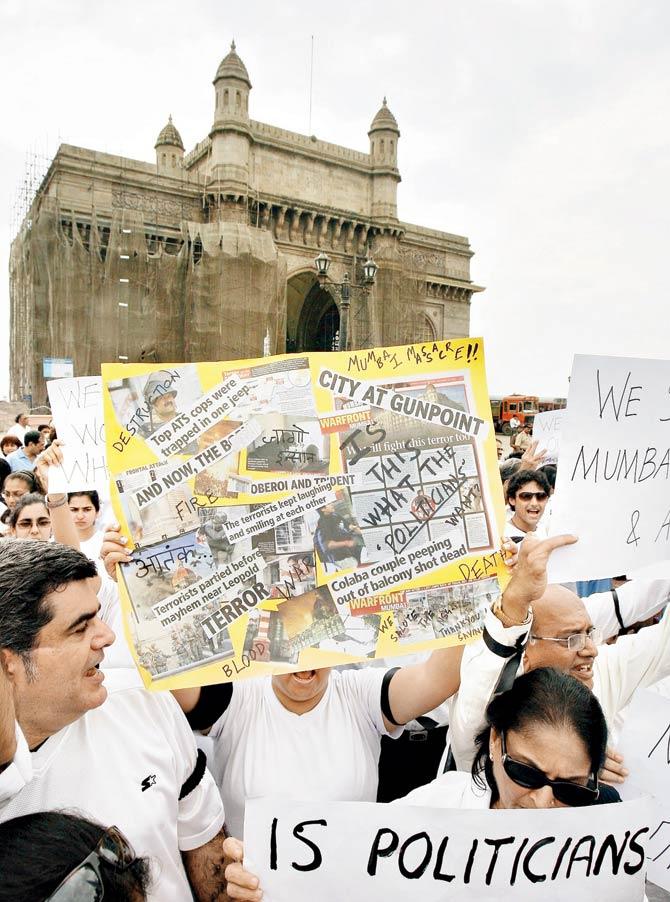As you watch images of Paris besieged by fear and people scrambling to get back to their lives, you cannot but think of Mumbai in November 2008.

Gateway of India
 As you watch images of Paris besieged by fear and people scrambling to get back to their lives, you cannot but think of Mumbai in November 2008. That was not the first time that Mumbai had been the target of hate and violence. But it was the first time that the city’s back appeared to be broken, the clichéd ‘spirit’ and ‘resilience’ now replaced by a deep, underlying anger.
As you watch images of Paris besieged by fear and people scrambling to get back to their lives, you cannot but think of Mumbai in November 2008. That was not the first time that Mumbai had been the target of hate and violence. But it was the first time that the city’s back appeared to be broken, the clichéd ‘spirit’ and ‘resilience’ now replaced by a deep, underlying anger.
The broken buildings Ajmal Kasab and his gang of terrorists left behind have been repaired but the scars run deeper than plaster and paint can fix. In 2008, we were not yet in a constant media and internet inspired race to find the right symbolic gesture and the right ‘hashtagged’ slogan to determine the occasion. No one changed their display pictures with the colours of the Indian flag and no world monuments stood solemnly in solidarity with Mumbai. No one said they loved the city in any language at all, except those of us left in it, looking at the pieces.
ADVERTISEMENT

Remembering 26/11: The public meeting at the Gateway of India in the first week of December 2008 was one of more frightening I’ve attended anywhere, with its venom against politicians and the calls for war, and most importantly, over the fact that all systems fell apart on November 26, 2008. file pic/AFP
Yes, there was world attention because Mumbai had suffered a terrible terrorist attack. But I cannot remember any Western nation either promising or enacting any punishment on the country that the terrorists came from. In fact, India was advised to be cautious and admired for not taking the military option. The same advice presumably was not given to France. And since only cursory attention has been paid to similar attacks by the same terrorist group in Beirut, Baghdad and Ankara by the rest of the world, one reaches the sad conclusion that some deaths have more impact than others.
March 13, the day after the serial bomb blasts of 1993 (coming as they did on the back of three months of sectarian violence), I remember Churchgate station being full of blood donation camps. Mumbai was not just back at work, it was back to helping the wounded, to picking up the pieces, to not giving in. The atmosphere was exuberant, infectious, gritty and strong. This was not a city that would be cowed down by some cowardly terrorists. Interviewing police personnel and firemen at the sites of the blasts, they too displayed that same sense of never-say-die.
Each terrorist attack since then has chipped away at Mumbai. Politicians have used that lever to create stronger fissures and we have let them. If the city was ripped apart by events between December 6, 1992 and March 12, 1993, whatever togetherness we tried to create on March 13, 1993, and the days after that, have been destroyed. Mumbai has become a city going through the motions. The only basis on which it can be called India’s most cosmopolitan city is that others are far worse.
In 2008, I saw a city confused, despondent and enraged. The public meeting at the Gateway of India in the first week of December 2008 was one of more frightening I’ve attended anywhere, with its venom against politicians and the calls for war. And deservedly, both the chief minister, the late Vilasrao Deshmukh, and the home minister, the late RR Patil, had to face enormous public anger for their seemingly irresponsible behaviour and callous comments, but most importantly, for the fact that all systems fell apart on November 26, 2008. The audacity of the terrorists was matched by the inefficiency with which we countered them. If everyone went to work the next day, it was because they had to make a living.
Commentators have talked about how bloodshed is not new to Paris, going back to the beheadings of the French Revolution. Yet that hardly seems significant in today’s situation, where Paris has to deal with today’s grief, today’s rebuilding of not just bricks and mortar, but of trust. There will be a chance to examine past mistakes and current rage and retaliation, but not now.
Now it is the human tragedy that the people of Paris have to come most to terms with. For all the televised drama of a terrorist attack in today’s world, the Paris attack takes me back to an old school friend dying in the Taj seven years ago. I just hope I never lose that memory or that sense of loss.
Ranjona Banerji is a senior journalist. You can follow her on Twitter @ranjona
 Subscribe today by clicking the link and stay updated with the latest news!" Click here!
Subscribe today by clicking the link and stay updated with the latest news!" Click here!







